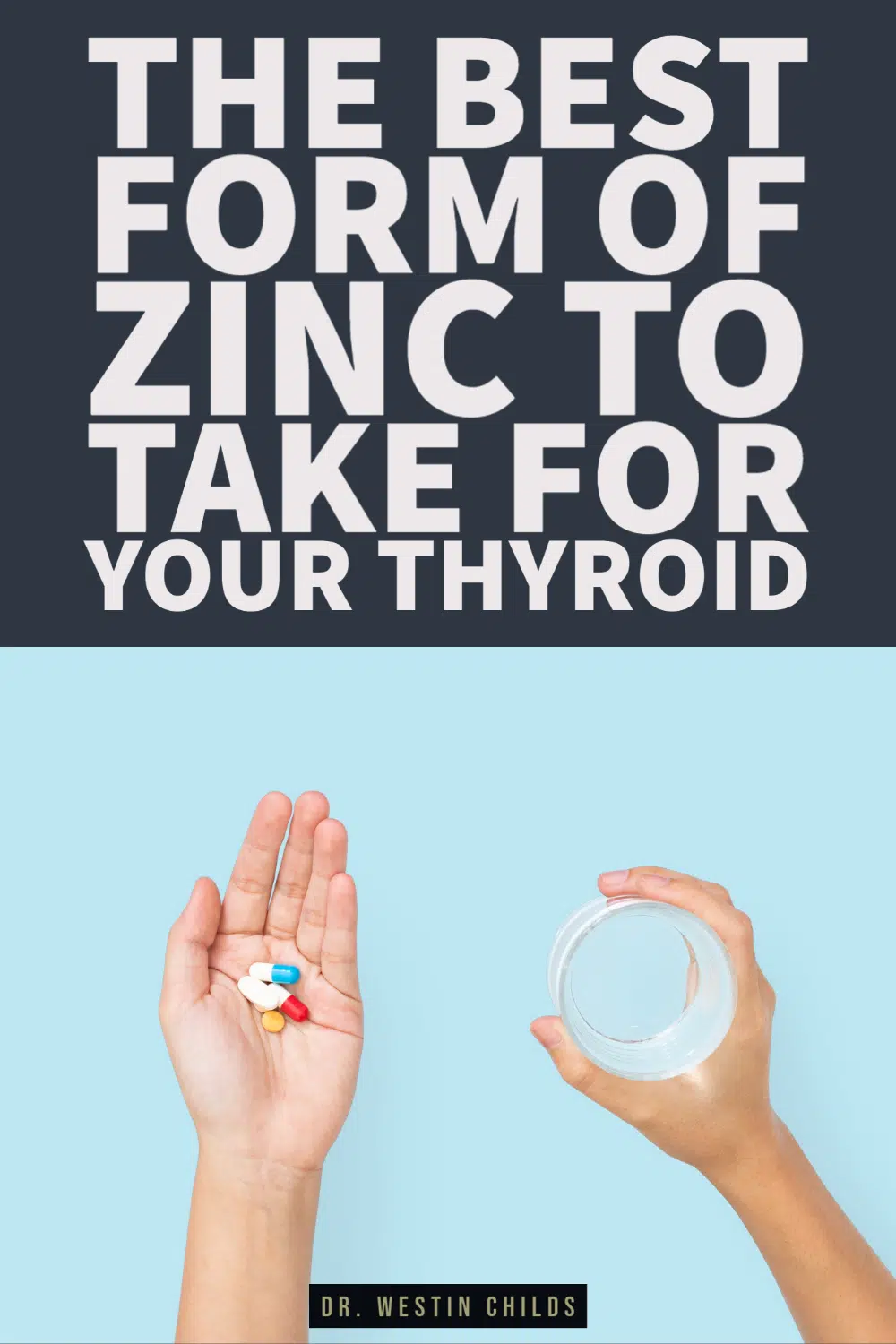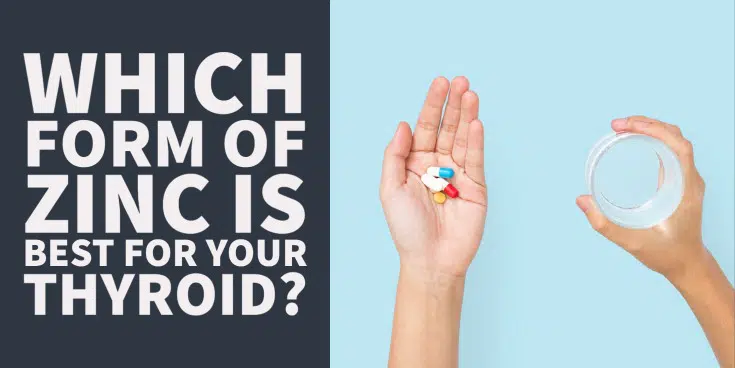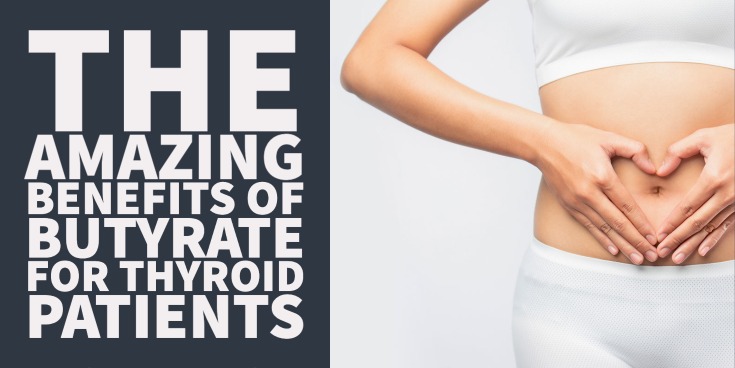Whenever I say that zinc is one of the most important nutrients for thyroid function, I’m always met with a response like:
“What about iodine?”
And while iodine is important (as are many others), there’s a good case to make that zinc is up there in the top 3.
Because of this, many thyroid patients often supplement with zinc.
And because I’ve been primarily helping thyroid patients for the last 6 years, I’ve seen quite a bit during that time.
One thing I know for sure:
Many thyroid patients are often taking the wrong type of zinc and the wrong form of zinc.
Even though they know that zinc is helpful for the thyroid they are missing out on its beneficial effects because they aren’t using the right type!
We aren’t here to focus on the benefits of zinc on thyroid function but they are so important that we should at least mention them.
The 5 main reasons your thyroid needs zinc include:
- It’s required for TRH (1) production – Without zinc, your TRH, TSH, T3, and T4 levels will all be low. You will be hypothyroid but your labs will look hyperthyroid to the untrained eye.
- It’s required for T4 to T3 conversion – If you don’t have enough zinc then you will have trouble creating enough T3 thyroid hormone through thyroid conversion!
- It’s required for binding of T3 to the thyroid nuclear receptor – Without zinc, your thyroid hormone will have a hard time binding to the nuclear receptor (2) in your cells which means your circulating thyroid hormone is less effective.
- Low zinc causes low thyroid symptoms – The connection between zinc and thyroid function is so strong that low levels cause reversible low thyroid symptoms.
- Low zinc inhibits T lymphocytes and immune function – Decreased immune function means that you may be at more risk for autoimmune disease.
When you realize that low thyroid function impairs zinc absorption and that hypothyroid patients are very likely to be zinc deficient, using zinc supplements becomes very appealing.
It’s been my experience that most patients with thyroid conditions do not have enough zinc and, therefore, benefit from zinc supplementation.
But before you run out to take advantage of these benefits you must be sure that you are using the right form!
If you aren’t then there’s no guarantee that you will get these benefits.
DOWNLOAD FREE RESOURCES
Foods to Avoid if you Have Thyroid Problems:
I’ve found that these 10 foods cause the most problems for thyroid patients. Learn which foods you should avoid if you have thyroid disease of any type.
The Complete List of Thyroid Lab tests:
The list includes optimal ranges, normal ranges, and the complete list of tests you need to diagnose and manage thyroid disease correctly!
The Best Forms of Zinc for Thyroid Function
If you are ready to take your zinc to the next level then here are the forms that you want to use:
- Zinc chelate (3)
- Zinc monomethionine
- Zinc gluconate
- Zinc acetate
- Zinc citrate
Each of these is utilized and absorbed by the body equally well.
This means that their benefit on thyroid function will be equal, provided you can get them into your body correctly (more on that below!).
So what I want you to do is grab your supplement bottle and take a look at the ingredient list.
On the back, you will see all of the ingredients including zinc.
Go to the section that says zinc and look in the parentheses.
You should see something like this:

In the parentheses, you will see the FORM of zinc that you are taking.
The form of zinc refers to whatever zinc is bound to help it get into your body.
And these forms alter how easily your body can use the zinc, what it needs to get rid of when it does, and when it will be absorbed in your gastrointestinal tract.
If your formulation of zinc is not one of the forms listed above, then you will want to swap out your zinc supplement for one that contains the right form.
Avoid These Forms of Zinc
You will notice that two common forms of zinc did not make the list:
- Zinc oxide
- Zinc picolinate (4)
Zinc oxide is the cheapest form of zinc and is not as well absorbed (5) as the other forms listed above.
Zinc oxide is commonly found in cheap supplements from manufacturers that are trying to drive down the price of their supplements.
Sometimes, it’s okay to do this, but not with zinc.
So check your supplements to see if they have zinc oxide. If they do, there’s a good chance that the quality of the other ingredients in there is not ideal so you’ll want to toss it out and replace it with one of the other forms of zinc mentioned above.
But what about zinc picolinate?
My recommendation to avoid this form of zinc is a little different.
When you look at the studies of zinc picolinate, they definitely show that this formulation of zinc is well absorbed by the body.
Because of this, I used to frequently recommend zinc picolinate as my preferred form of zinc for thyroid patients.
But not anymore.
Upon taking a closer look at the studies, they show that while zinc picolinate is well absorbed, some of that zinc is eliminated from the body in the urine and through hair follicles in the very same form it was consumed as.
One way to look at this information is to view the binding of zinc to picolinic acid as something that is so strong that it prevents the body from breaking that bond and allowing it to use zinc in its elemental form.

Whether or not this occurs for sure is unclear, at least based on the current studies.
But when you have other forms of zinc that don’t have this issue and that are as equally absorbed as zinc picolinate, why take the risk?
In my experience, there is no difference between zinc picolinate and zinc citrate or zinc chelate in terms of how they get into the body and impact thyroid function.
For these reasons, I don’t recommend zinc bound to picolinic acid.
How Much Zinc Should You Take Each Day?
My recommendation is to take around 5 to 15mg of zinc per day.
Here’s why:
We know that the human body can only absorb around 7 to 10mg of zinc at any given time (6).
So taking doses higher than this range is not ideal because most of it won’t make it into your body.
The 5 to 15mg dose that I recommend puts you in the optimal range for absorption and limits the negative side effects that can be associated with zinc supplementation (more on this below).
Why, then, do supplements contain such high doses of zinc?
That part isn’t clear to me but probably because they know that not everyone will absorb the full amount in the supplement.
The creators of zinc supplements probably also assume that you will take your zinc with food (not ideal) which will further impair zinc absorption.
If, for instance, you are taking a 30mg dose of zinc with a meal, your body may only absorb some fraction of it.
Even though you started with 30mg, depending on the meal you take it with, some large portions may bind to and inhibit the full amount from getting into your body.
To combat this, they usually increase the dose.
But there’s one big problem with that:
High doses of zinc can cause indigestion, stomach problems, cramping, and even nausea (7).
This effect appears to be dose-dependent, though, and there are ways to solve this issue:
Dealing with Stomach Problems When Taking Zinc
One of the most common symptoms when taking zinc is an upset stomach!
I’ve personally experienced this side effect and can tell you that it isn’t fun.
So what can you do about it?
There are a few things you should consider:
The first is that the higher your dose of zinc the more likely it is to cause stomach indigestion.
So make sure that you are taking a dose in the 5 to 15mg range!
The second is that it’s always ideal to take zinc on an empty stomach if at all possible.
This will give your gut the best chance possible to absorb all of the zinc you are taking.
If you can’t take your zinc on an empty stomach then take it will a full glass of water.
Flooding your stomach with a big glass of water is often enough to fix indigestion.
Make sure you don’t take a ‘sip’ of water! You’re looking to get at least 8 or more ounces of water.
If that still doesn’t work then you will want to take your zinc with food.
Even though taking zinc with food isn’t ideal, it’s still better than not taking your zinc at all.
Just be sure to take zinc as far away as possible from foods such as whole grains, nuts, seeds, and legumes because they contain phytate (8) and phytate can block the absorption of zinc (9).
The Copper/Zinc Ratio
Whenever the topic of zinc supplementation comes up, the topic of the zinc:copper ratio is not far behind.
While there have been some studies that show that an imbalance in this ratio may lead to some health problems (10), these studies do not prove a causal relationship between the problems and the ratio.
In other words, the studies simply suggest that when someone has a health problem their copper:zinc ratio is out of balance.
But we have good evidence to believe that unhealthy states lead to this imbalance.
For instance, inflammation raises plasma copper and lowers plasma zinc.
And because inflammation is at the root of pretty much every chronic health condition, anyone with an inflammatory condition will end up with an imbalance in their zinc:copper ratio.
But it’s not the ratio causing the problem, it’s the inflammation.
With that in mind, focusing on the zinc-to-copper ratio when using zinc supplements is rarely required in thyroid patients.
Thyroid patients, by virtue of how thyroid hormone impacts zinc absorption, tend to result in low zinc levels.
This is why most thyroid patients can get by without worrying about their ratio.
More important than focusing on your copper level is focusing on reducing inflammation and optimizing your zinc level!
As you reduce inflammation and take zinc supplements, you should see a drop in your copper and a rise in your zinc which will bring you to the healthy and optimal levels you want to be at.
If you use a supplement such as this one, which contains both copper and zinc at the right levels, then you won’t have to worry about the ratio unless in very specific circumstances.
Your Next Steps
If you want to take full advantage of the benefits that zinc has to offer then make sure you double-check the supplements you are using.
Grab them and check the back to see what type of dose you are taking and what form of zinc you are taking.
If your zinc doesn’t meet the requirements listed above then it’s time to go looking for a new supplement!
You can take the easy path and use the ones that I recommend here which meet these criteria or you can go searching elsewhere for them.
It doesn’t matter to me where you get your zinc, just make sure you are using the right type, form, and dose!
And now I want to hear from you:
Are you using the right type of zinc?
Have you been using the wrong form?
Have you experienced any negative side effects when using zinc?
Have you noticed any benefits?
Leave your questions or comments below!
Scientific References
#1. https://pubmed.ncbi.nlm.nih.gov/30982439/
#2. https://www.jbc.org/article/S0021-9258(18)81732-X/pdf
#3. https://pubmed.ncbi.nlm.nih.gov/26507438/
#4. https://pubmed.ncbi.nlm.nih.gov/3630857/
#5. https://www.ncbi.nlm.nih.gov/pmc/articles/PMC3901420/
#6. https://www.ncbi.nlm.nih.gov/pmc/articles/PMC7146416/
#7. https://www.ncbi.nlm.nih.gov/books/NBK547698/
#8. https://www.hsph.harvard.edu/nutritionsource/anti-nutrients/
#9. https://pubmed.ncbi.nlm.nih.gov/7712343/
#10. https://pubmed.ncbi.nlm.nih.gov/25660061/









